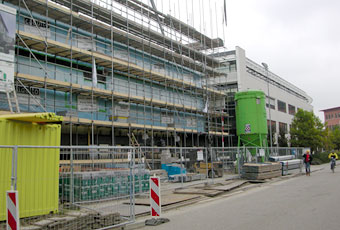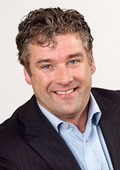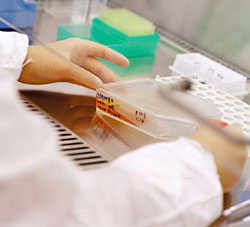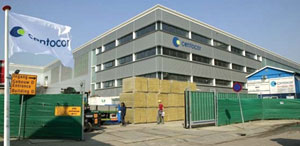
|
|
COVER STORY:
EUROPEAN BIOTECHNOLOGY From Site Selection magazine, January 2007
Biotech Builds In
Key European Cities
r. Ronald Brus, president and CEO of Crucell, likens Leiden to the U.S. biotech centers, but on a smaller scale. “Leiden is the San Francisco of the Netherlands in terms of biotechnology,” Brus says. “Once there is a critical mass in such a city, you see that the original reasons why you are in a city are no longer the most prominent.” Crucell is a Dutch biotech firm specializing in development of vaccines and antibodies for an array of diseases, including hepatitis B, childhood diseases and influenza. Based in the Netherlands’ Leiden biotech cluster, Crucell is in the midst of a major expansion, adding a process technology center next to its headquarters building. The new center will give Crucell the in- house capability to support vaccine, protein and monoclonal antibody process design and development and will reduce outsourcing requirements. Crucell is a product of research at the University of Leiden. Brus believes Holland, Switzerland and Germany will be the focus of future European biotech expansion. The industry is entrenched in those countries, but areas within them are increasingly specializing in certain areas. Hessen, Germany, for example, is now known for its biomanufacturing industry. Brus says the quality of life in Switzerland makes it easy for Swiss firms to attract skilled people. He says the accumulation of biotech companies in the Leiden area also makes it easy to attract talent. “The U.K. does not play as important a role as it did 10 to 15 years ago,” Brus says. “In five or 10 years from now, I don’t know. It’s always important to have biotech hot spots to increase attractiveness.” Brus says the fact that other biotech firms such as Centocor, Pharming and Galapagos are located in Leiden is a plus in attracting top talent. Galapagos is a former joint venture with Crucell and is now a stand- alone company specializing in discovery of drugs to find bone and joint diseases. “People are looking for a company with a critical mass,” Brus says.
“A small start- up is an uncertain bet. The top talent is looking for established companies that can at least prove they have a track record, a solid position and a solid line of financial backing. From a scientist’s point of view, it’s important that they are surrounded by other scientists who publish in the top journals. “Crucell and Galapagos are role models and demonstrate that in four to five years you can turn a good idea into something that is tangible,” Brus says. “Biotech companies have all kinds of levels of people to hire and it’s important that we find highly qualified people with unique experience in biotech or science. It’s now easier to find those people in process development than it was five years ago. Every time one of our scientists is published in a journal, it’s easier for us to attract more scientists.” Many of Leiden’s biotech companies are in the Leiden BioScience Park, the largest cluster in the Netherlands and one of the oldest biotech parks in continental Europe. The park, which is connected to Leiden University, has a major expansion plan in the works that will double its space. About 5,000 people work in the companies and institutions in the park. Stem Cell Innovations, a Houston- based cell biology company, is one of the latest firms to locate in the park. SCI opened its European R&D facility there in June 2006. CEO Dr. James Kelly said the move puts the company in a better position to serve the growing European market for high- quality drug discovery tools. Centocor has the largest presence in the Leiden BioScience Park and recently completed a $250- million production facility there. Called RemiCap 150, the new plant doubles capacity to manufacture Centocor’s main product, Remicadea, a drug used in the treatment of Crohn’s disease and rheumatoid arthritis. Ellen Roest, a spokeswoman for Centocor’s Leiden operations, says Leiden has the key infrastructure for continued biotech development. “The university supplies us with employees at all levels and the city has been very supportive, Roest says.
Scotland Finding Biotech Niche
Scotland, home to about 20 percent of the U.K. biotech industry, has seen several recent significant expansions in the sector. Austria- based Intercell, a specialist in the production and distribution of vaccines for infectious diseases, is expanding the facility it bought in Livingston in 2004, to ramp up production of its Japanese encephalitis vaccine. Intercell purchased the plant from Excel Biotech and had been in discussions about having Excel manufacture Intercell vaccine. “We decided to buy the facility and keep it running,” says Gerd Zettlemeissl, Intercell’s CEO. “Meanwhile, we have a bit of experience at this site. It was a very good choice to locate there. It has excellent people and a very good education system in biotech production and bio engineering.” Intercell was founded in 1999 as a spinout of the University of Vienna, and employs 170 worldwide with the biggest group of 120 employees in Vienna. Intercell plans to have its vaccine in the U.S. market during 2007 and in Europe by 2008 pending regulatory approval. Zettlemeissl says Intercell has done a lot of partnering with the “best in class” names in vaccine development including Merck, SanofiPasteur, Wyeth and Novartis. In fact, in October, Intercell announced an extension of its strategic partnership with Merck Sharp and Dohme Research, an affiliate of Merck & Co., to include development of vaccine against Group A streptococcus infections. The key to attracting top scientific talent is to be located in a cosmopolitan area with a great quality of life, Zettlemeissl says, adding that Intercell’s home base of Vienna has been attractive enough to lure people from 14 different nations. “What you have to have is a place where you can recruit internationally,” Zettlemeissl says. “Vienna, with its international environment, is a good place. Scotland, and Edinburgh, especially, has a similar kind of environment where you can recruit internationally. I would say there is not disadvantage at all for Europe over the U.S. You need to be in one of the big cities in Europe for recruiting purposes.” Zettlemeissl says other European cities with great promise in biotech include Munich and Frankfurt in Germany, Basel, Geneva and Zurich in Switzerland and London and Paris. The Edinburgh suburb of Roslin gained global attention when it was featured as a prominent location in the novel and subsequent movie The DaVinci Code. Now the small town is at the forefront of stem cell science in Scotland. The Roslin Cells Centre is a partnership between the Roslin Institute, Scottish Enterprise Edinburgh and Lothian, the University of Edinburgh and the Scottish National Blood Transfusion Service. The Roslin Cells Centre will create clinically useable human stem cell lines compliant with U.K. and European regulatory requirements. The Centre will initially be based at the Roslin Institute, a biotech research facility, before transferring to the Centre for Biomedical Research being developed by the University of Edinburgh and Scottish Enterprise. Another recent expansion in Scotland involved Invitrogen, which is creating a new global corporate research center in Inchinnan that will also become the company’s European headquarters. Invitrogen, which provides an array of life science technologies, is investing nearly $34 million in the project.
TOP OF PAGE
|
©2007 Conway Data, Inc. All rights reserved. SiteNet data is from many sources and not warranted to be accurate or current.
|

 Ronald Brus is the president and CEO of Crucell, a biotech firm based in Leiden, Netherlands.
Ronald Brus is the president and CEO of Crucell, a biotech firm based in Leiden, Netherlands.
